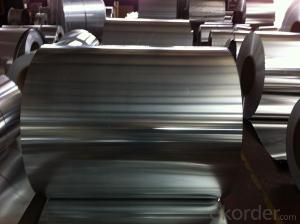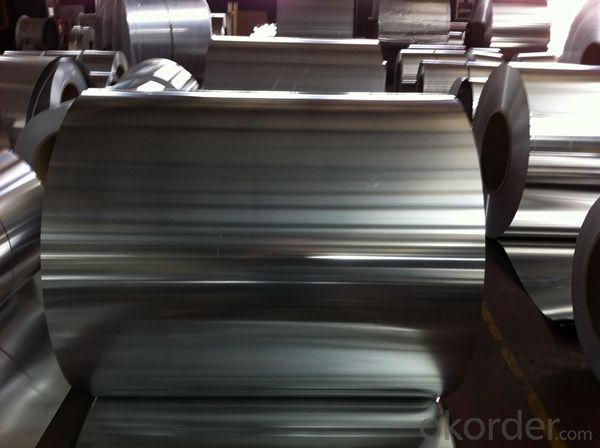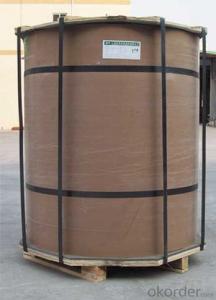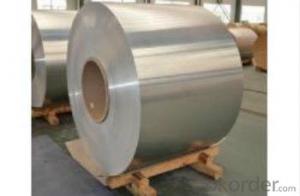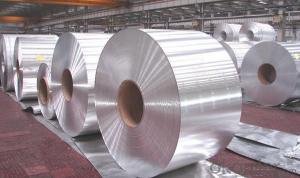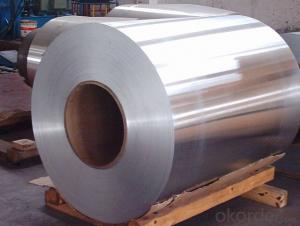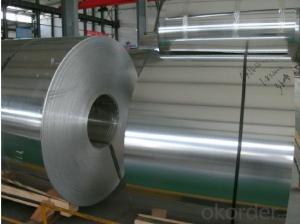6061 Aluminum Coil - Mill Finished Aluminum Coil AA1070 for Building
- Loading Port:
- Shanghai
- Payment Terms:
- TT OR LC
- Min Order Qty:
- 5 m.t.
- Supply Capability:
- 10000 m.t./month
OKorder Service Pledge
OKorder Financial Service
You Might Also Like
Specification
1. Specification of Mill Finished Aluminium Coil AA1070 for Building
characteristics | Application |
1) Super peeling strength | 1) Building exterior curtain walls |
2) Excellent surface flatness and smoothness | 2) Decoration and renovation additions for old buildings |
3) Superior weather, corrosion, pollutant resistance | 3) Decoration of interior walls, ceilings, bathrooms, kitchens and balconies |
4) Even coating, various colors | 4) Shop door decorations |
5) Fireproof, excellent heat and sound insulation | 5) Advertisement board display platforms and signboards |
6) Superior impact resistance | 6) Wallboards and ceilings for tunnels |
7) Lightweight and easy to process | 7) Industrial materials, materials for vehicles and boats |
2. Application of Mill Finished Aluminium Coil AA1070 for Building
(1).Interior: wall cladding, ceilings, bathrooms, kitchens and balconies, shutters, doors...
(2).Exterior: wall cladding, facades, roofing, canopies, tunnels, column covers , renovations...
(3).Advertisement: display platforms, signboards, fascia, shop fronts...
3. Feature of Mill Finished Aluminium Coil AA1070 for Building
• Our goods quality is top, the surface is smooth, and every steel coil
• No Joint, No Bends, no spots, no roller marks.
• MTC will be provided with goods, third part inspection is acceptable, for example, SGS, BV. Etc
Be free from Oil Stain, Dent, Inclusion, Scratches, Stain, Oxide Dicoloration, Breaks, Corrosion, Roll Marks, Dirt Streaks and other defect which will interfere with use
4. Certificate:
SGS and ROHS(if client request, paid by client), MTC(plant provided), Certificate of Origin(FORM A, FORM E, CO), Bureau Veritas and SGS (if client request, paid by client), CIQS certificate
5. Image of Mill Finished Aluminium Coil AA1070 for Building
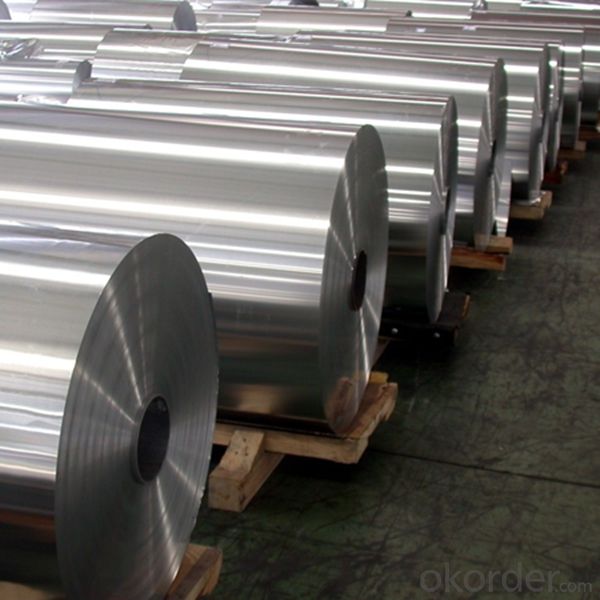
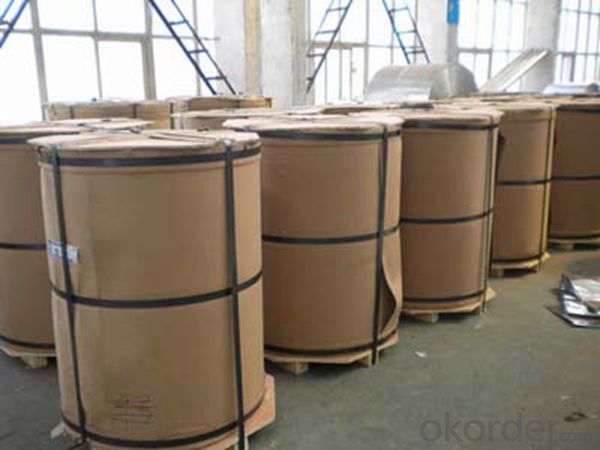
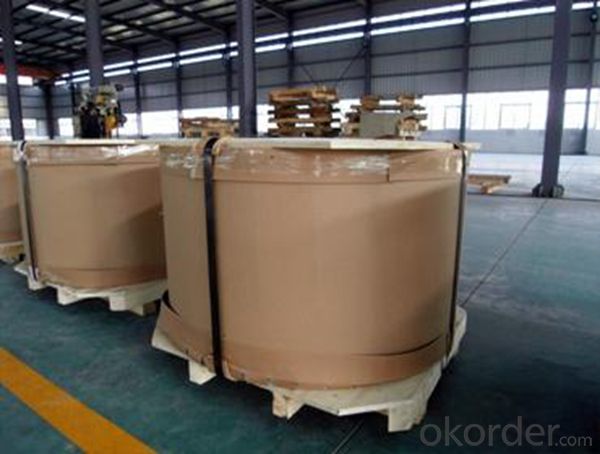
6. Package and shipping of Mill Finished Aluminium Coil AA1070 for Building
eye to wall
eye to the wall
with wood pallet (wooded case also available)
7. FAQ
1) What is the delivery time?
Dpends on actual order, around 20 to 35 days
2)What is the QC system:
We have QC staff of 20 persons and advanced equipment, each production is with MTC traced from Aluminum ingot lot.
3) What market do you mainly sell to?
Australia, America, Asia, Middle East, Western Europe, Africa etc
- Q: What is the electrical conductivity of aluminum coils?
- The electrical conductivity of aluminum coils is relatively high. Aluminum is known for its good conductivity, with a conductivity rating of approximately 37.7 x 10^6 siemens per meter (S/m). This makes aluminum an excellent choice for various electrical applications, including the manufacturing of coils. The high conductivity of aluminum allows for efficient transmission of electric current through the coils, making them suitable for use in electrical wiring, transformers, motors, and other electrical equipment.
- Q: What is the maximum temperature resistance of aluminum coils?
- The maximum temperature resistance of aluminum coils depends on various factors, such as the alloy composition, purity, and the specific application. However, in general, aluminum has a relatively low melting point of around 660 degrees Celsius (1220 degrees Fahrenheit). Consequently, the maximum temperature resistance of aluminum coils typically ranges between 200 and 400 degrees Celsius (392 to 752 degrees Fahrenheit). Beyond these temperatures, aluminum may start to undergo structural changes, such as softening or deformation, which can impact its performance and integrity. Therefore, it is important to consider the specific requirements and limitations of the application when determining the maximum temperature resistance of aluminum coils.
- Q: How do aluminum coils contribute to energy-efficient appliance manufacturing?
- Aluminum coils play a significant role in energy-efficient appliance manufacturing due to their unique properties and benefits. Firstly, aluminum is a lightweight material, which means that using aluminum coils in appliances reduces their overall weight. This, in turn, allows for easier transportation and installation, resulting in reduced energy consumption during transportation and reduced strain on the appliance itself. Furthermore, aluminum has excellent thermal conductivity properties, which are crucial in energy-efficient appliance design. When used in coils, aluminum enables efficient and rapid heat transfer, allowing appliances such as refrigerators, air conditioners, and heat pumps to cool or heat more effectively while consuming less energy. This enhanced thermal efficiency not only reduces energy consumption but also improves the overall performance and lifespan of the appliance. Additionally, aluminum coils are highly corrosion-resistant, making them ideal for appliances that come into contact with moisture or humid environments. By using aluminum coils, manufacturers can ensure that their appliances are durable and long-lasting, avoiding the need for frequent repairs or replacements. This durability reduces energy waste associated with the manufacturing and disposal of appliances. Moreover, aluminum is a highly recyclable material, with the potential for infinite recycling without losing its properties. By incorporating aluminum coils into appliance manufacturing, manufacturers can promote sustainability and reduce their carbon footprint. The use of recycled aluminum also requires significantly less energy compared to producing new aluminum, further contributing to energy efficiency. In conclusion, aluminum coils contribute to energy-efficient appliance manufacturing through their lightweight nature, excellent thermal conductivity, corrosion resistance, recyclability, and overall durability. By utilizing these advantages, manufacturers can create appliances that are not only more energy-efficient but also more sustainable and long-lasting, benefiting both consumers and the environment.
- Q: What are the different tensile strengths of aluminum coils?
- The tensile strength of aluminum coils can vary depending on the specific alloy and temper of the aluminum used. Aluminum alloys commonly used for coils include 1100, 3003, 5052, and 6061. The tensile strength of these alloys can range from approximately 13,000 psi (90 MPa) for 1100 aluminum to around 45,000 psi (310 MPa) for 6061 aluminum. The temper of the aluminum also plays a significant role in determining its tensile strength. The most common temper for aluminum coils is H14, which means the material has been strain-hardened and partially annealed to achieve a balance of strength and formability. Other tempers such as H18, H24, and H32 can result in higher tensile strengths, whereas softer tempers like O (annealed) or H12 can have lower tensile strengths. It is important to note that these values are general ranges and can vary slightly depending on the specific manufacturer and production process. Additionally, factors such as thickness, width, and surface treatment of the aluminum coils can also influence their tensile strength. Therefore, it is recommended to consult the manufacturer's specifications or test the specific aluminum coil to accurately determine its tensile strength.
- Q: Explain how aluminum coils impact the manufacturing process.
- <p>Aluminum coils significantly affect the production process by offering versatility and efficiency. They are easily formed, cut, and shaped, which streamlines manufacturing. Their lightweight nature reduces the energy consumption in transportation and handling. Additionally, aluminum coils' corrosion resistance and durability reduce waste and the need for frequent replacements, enhancing sustainability. They also contribute to the production of various products, such as automotive parts, construction materials, and packaging, by providing a consistent and high-quality material.</p>
- Q: What is an aluminum coil?
- An aluminum coil is a long, flat, and thin piece of aluminum that is typically wound into a spiral shape. It is commonly used in various industries, such as construction, automotive, and electrical, due to its excellent corrosion resistance, lightweight nature, and high conductivity. Aluminum coils are often used for manufacturing products like gutters, roofing materials, heat exchangers, and electrical components.
- Q: Can aluminum coils be used for electrical transformers?
- Yes, aluminum coils can be used for electrical transformers. Aluminum is a suitable material for transformer coils due to its high electrical conductivity and lower cost compared to copper. While copper has traditionally been the preferred choice for transformer windings, the use of aluminum has gained popularity in recent years due to its lighter weight and lower price. Aluminum coils are also advantageous in terms of thermal conductivity, as they dissipate heat more efficiently than copper. However, it is important to consider the specific requirements and design considerations of the transformer, as the choice between aluminum and copper coils may depend on factors such as voltage, current, size, and insulation requirements.
- Q: What’s the difference between natural cooling and slice cooling?
- Cooling with furnace means after thermal insulation, stop heating furnace and make the parts in the furnace cool slowly to the room temperature with the furnace. Natural cooling is a kind of cooling method utilizing fluid circulation based on the fact that density varies with temperature to remove hea
- Q: What precautions should be taken when operating a welding torch on aluminum coils to ensure safety?
- <p>When using a welding torch with aluminum coils, it's crucial to follow safety measures to prevent accidents and ensure a safe working environment. Always wear appropriate personal protective equipment (PPE), including heat-resistant gloves, safety glasses, and a welding helmet. Ensure the work area is well-ventilated to avoid inhaling fumes. Use a backdraft hood or fume extraction system to capture and remove welding fumes. Keep the work area clean and free of flammable materials. Regularly inspect the torch for any damage or wear. Use the correct type of welding rod for aluminum and ensure the gas supply is compatible with aluminum welding. Never leave a lit torch unattended and always follow the manufacturer's guidelines for safe operation.</p>
- Q: Are aluminum coils resistant to moisture?
- Indeed, moisture poses no threat to aluminum coils. Being inherently resistant to corrosion, aluminum possesses an innate capability to combat the detrimental effects of moisture and other environmental elements. Consequently, it becomes an exceptional option for endeavors where moisture resistance holds paramount importance, including HVAC systems, refrigeration units, and outdoor equipment. Furthermore, aluminum can be fortified with an assortment of protective coatings and treatments to augment its moisture resistance and prolong its lifespan. In summary, the durability and moisture-withstanding capacity of aluminum coils render them a dependable choice across diverse industries.
Send your message to us
6061 Aluminum Coil - Mill Finished Aluminum Coil AA1070 for Building
- Loading Port:
- Shanghai
- Payment Terms:
- TT OR LC
- Min Order Qty:
- 5 m.t.
- Supply Capability:
- 10000 m.t./month
OKorder Service Pledge
OKorder Financial Service
Similar products
Hot products
Hot Searches
Related keywords
